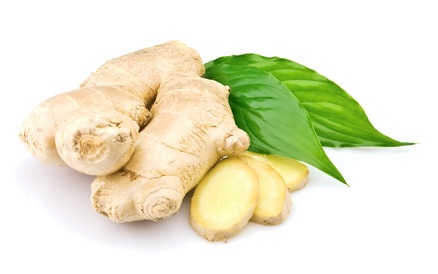
- Ginger is part of the herb family. It has a brown skin on the outside, and is creamy colored on this inside.
- The spicy, aromatic herb is often used in Asian cuisine to flavor dishes.
- Organic ginger is well known for its anti-nausea and motion sickness curing properties.
- Less known is ginger’s cancer prevention properties.
- Research is mounting for the anti-cancer benefits of ginger.
- A study at the University of Minnesota showed that compounds in ginger called gingerols play a crucial role in preventing the development of colorectal cancer. Another study conducted by Dr. Rebecca Liu at the University of Michigan showed that gingerols were also able to kill ovarian cancer cells.
- A study published in the Journal of Biomedicine and Biotechnology found that “ginger may be a promising candidate for the treatment of breast carcinomas.”
- The 2012 study was conducted by researchers at the Biological Sciences Department, Faculty of Sciences, King Abdulaziz University, Saudi Arabia.
- They discovered that extracts from ginger prevented to spreading of breast cancer cells, without disturbing non-cancerous breast cells. This type of inhibition is known as selective cytotoxicity, which is not found in conventional treatments.
- The research team noted the problems with current conventional breast cancer therapies: “Despite significant advances toward targeted therapy and screening techniques, breast cancer continues to be a chronic medical problem worldwide, being the most common type of cancer in women and the leading cause of death. Typically, the treatment of breast cancer involves hormonal therapy with tamoxifen or other selective estrogen receptor (ER) modulators. However, almost all patients with metastatic disease and approximately 40% of patients that receive tamoxifen experience relapse that ends by death. In addition, the clinical utility of ER antagonists is often limited by side effects and is largely ineffective against ER-negative breast cancer. Furthermore, despite the fact that many tumors initially respond to chemotherapy, breast cancer cells can subsequently survive and gain resistance to the treatment.”
- They also added that despite the known anti-cancer properties of ginger, the mechanisms behind these properties are not known for breast cancer. They launched this research to investigate the impacts of ginger extracts on breast cancer cells.
- Through this study, they were able to find the mechanisms behind ginger and its anti-cancer properties, including the following:
- Induction of apoptosis (programmed cell death)
- Upregulation of Bax (a pro-apoptosis gene)
- Downregulation of Bcl-2 proteins (cancer-associated)
- Downregulation of prosurvival genes NF-κB, Bcl-X, Mcl-1, and Survivin
- Downregulation of cell cycle-regulating proteins, including cyclin D1 and cyclin-dependent kinase-4 (CDK-4). (cancer-associated)
- Increased expression of CDK inhibitor, p21 (anti-cancer associated)
- Inhibition of c-Myc, hTERT (cancer-associated)
- Tip: We recommend adding ginger to your recipes to reap the anti-cancer benefits of ginger.
- Try our homemade ginger ale recipe, or try adding a 1-inch piece of ginger to your tea.
-
- AS ALWAYS: Check with your health practitioner before you change your diet. This organic food is not meant to replace any treatment or drugs you are taking.
-
- DON’T FORGET to sign up for our weekly newsletter to get our latest articles, updates, free recipes and giveaways.
-
- For the health benefits of ginger.
- For a homemade ginger ale recipe.
- Some information included in this article is courtesy of Sayer Ji, Founder of GreedMedInfo.com, which is the world’s most widely referenced natural health resource.
-
- REFERENCES:
- 1. “Research: Ginger Selectively Kills Breast Cancer Cells.” GreenMedInfo. GreenMedInfo, 01 Oct. 2012. Web. 20 Aug. 2014.
- 2. “Differential Control of Growth, Apoptotic Activity, and Gene Expression in Human Breast Cancer Cells by Extracts Derived from Medicinal Herbs Zingiber Officinale.” National Center for Biotechnology Information. Journal of Biomedicine & Biotechnology, 2012. Web. 20 Aug. 2014.
- 3. “[6]-Gingerol Suppresses Colon Cancer Growth by Targeting Leukotriene A4 Hydrolase.” National Center for Biotechnology Information. Cancer Research, 01 July 2009. Web. 20 Aug. 2014.
- 4. “Pharmacokinetics of 6-, 8-, 10-Gingerols and 6-Shogaol and Conjugate Metabolites in Healthy Human Subjects.” National Center for Biotechnology Information. U.S. National Library of Medicine, Aug. 2008. Web. 20 Aug. 2014.


















